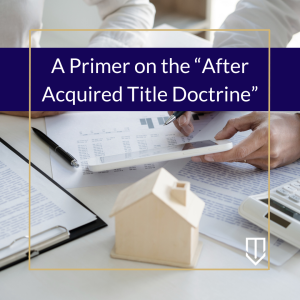
When it comes to real estate transactions, ensuring a clean and clear title is essential. However, what happens if a property is sold without a perfect title, only for the seller to acquire the missing rights or interests later? This scenario is where the After Acquired Title Doctrine comes into play. In this blog, we’ll discuss what this doctrine entails, its implications for buyers and sellers, and how it impacts real estate transactions.
What is the “After Acquired Title Doctrine”?
The After Acquired Title Doctrine is a legal principle that addresses situations where a seller transfers property without having complete ownership or rights to the property at the time of sale.
California Civil Code section 1106 defines the After Acquired Title Doctrine as: “Where a person purports by proper instrument to grant real property in fee simple, and subsequently acquires any title, or claim of title thereto, the same passes by operation of law to the grantee, or his successors”.
The After Acquired Title Doctrine generally does not apply when the seller receives title by quitclaim deed. The deed conveying the land must include words expressing an intention to vest title in the grantee. In other words, a deed purporting to convey a fee simple has, as a matter of law, the same effect as if it contained an express provision that the grantor conveyed all the estate the grantor then possessed or that he or she might later acquire.” (Younger v. Moore (1909) 155 Cal. 767; Warburton v. Keiferle (1955) 135 Cal.App.2d 278.)
Where the seller later acquires the missing rights or interests, however, then those rights are automatically transferred to the buyer, even if they were not explicitly included in the original sale agreement. The rule cannot be defeated by taking title in the name of another who has no real interest in the transaction. In that situation, the law deems that the title taken by the third person is held by the grantee. (Quivey v. Baker (1869) 37 Cal. 465.)
What is an Example?
An example of After-Acquired Title would be if an individual, the son, signed, acknowledged, and recorded a deed of his late father’s house to another individual, his cousin, even though the son had not yet received title from his father’s estate. Once the son received the title from his father’s estate and recorded it, the After-Acquired Title would automatically pass on to the cousin.
Another example would be where an owner of property that generates oil and gas royalties conveys only the royalties to her daughter by a grant deed, and then sells the property to another party without mentioning the royalties, and then later receives a deed back from the daughter. (Schwen v. Kaye (1984) 155 Cal.App.3d 949.) In that situation, the law deems that the buyers of the property had a right to the royalties under the after-acquired title doctrine, regardless of the seller’s intent.
What are the implications for Buyers?
For buyers, the After Acquired Title Doctrine can offer a level of protection. If a seller lacks complete ownership of a property at the time of sale but later obtains the missing rights, the buyer’s ownership rights are still upheld. This means that even if there are defects in the title at the time of purchase, the buyer can still gain full ownership once the seller acquires the necessary rights.
However, buyers should proceed with caution. While the doctrine protects against title defects that are later remedied by the seller, it does not cover situations where the seller cannot acquire the missing rights or interests. Buyers should conduct thorough due diligence to identify any potential title issues before completing the purchase.
What are the implications for Sellers?
From a seller’s perspective, the After Acquired Title Doctrine can provide an opportunity to rectify title defects after the sale. If a seller discovers they lack complete ownership or rights to the property post-sale, they can work to obtain the missing rights or interests. Once acquired, these rights automatically transfer to the buyer under the doctrine, minimizing the risk of legal disputes or challenges to the sale.
However, sellers should be aware that rectifying title issues after the sale can be a complex and potentially costly process. It may involve negotiating with third parties, obtaining additional documentation, or even going through legal proceedings. As such, sellers should strive to address any title concerns before listing the property for sale to avoid complications down the line.
It’s essential to note that the After Acquired Title Doctrine may vary in application depending on jurisdiction and specific circumstances. While some jurisdictions recognize and enforce the doctrine, others may have different rules or interpretations regarding post-sale title acquisitions.
Additionally, the doctrine’s application may be subject to certain limitations or exceptions. For example, it may not apply in cases of fraud or misrepresentation by the seller, or if the buyer expressly waives their rights under the doctrine in the sale agreement.
Conclusion
The After Acquired Title Doctrine plays a significant role in real estate transactions, providing a framework for addressing title defects that arise after the sale. For buyers, it offers protection against unforeseen title issues, while sellers have the opportunity to remedy defects and uphold their contractual obligations.
However, both buyers and sellers should proceed with caution and seek legal advice when dealing with title matters. Conducting thorough due diligence before completing a real estate transaction can help mitigate risks and ensure a smooth transfer of ownership.
Ultimately, understanding the After Acquired Title Doctrine and its implications is essential for navigating the complexities of real estate transactions and protecting the interests of all parties involved. At the Underwood Law Firm, we specialize in Partition Actions, which may involve issues related to deeds and title. If you have a difficult co-ownership situation involving a question about a deed, please do not hesitate to contact us.










